
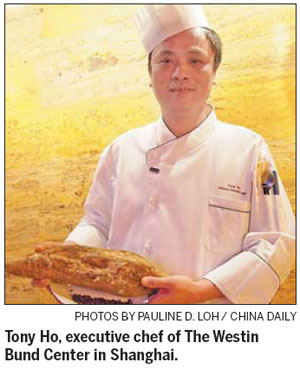
There is one place in Shanghai where the chef checks the weather before planning his soup du jour. Pauline D. Loh cajoles him into sharing recipes.
It's Sunday and the chef is off, but he gamely joins us for dinner and not only does he share his culinary philosophy but at the end of the day, I also go home happily with some of his secret recipes.
Chef Tony Ho is the Chinese executive chef of The Westin Bund Center in Shanghai. In a city where business people come and go from all over the country and all over the world, it is not easy to plan a menu that pleases most palates.
For this chef, the secret is cooking not just according to the seasons, but with an eye on the weather. Shanghai can be hot and humid, or cold and damp, and a bowl of the right potion can perk up a person effectively and offer comfort with a taste of home.
The day we dined, the soup of the day was made with arrowroot and little red beans, slowly and lovingly slow-cooked to extract all its nutritious possibilities. It was cold and damp outside, and the warming bowl of thick, fragrant brew chased away the chills and warmed our hearts and stomachs.
Chef Ho subscribes to the age-old traditional Chinese medicine belief that food is medicine, and every mouthful served on his table at Crystal, the Asian restaurant at the Westin, is both delicious and nutritious.
Not a single grain of monosodium glutamate is found in his kitchen and he depends on his skills to coax the maximum flavor out of every ingredient.
Thus, the signature fish in Crystal is the marbled goby, a freshwater fish with extremely sweet and delicate flesh. Steamed with nothing more than slivered ginger and spring onions as flavoring, the fish is then dressed with a ladleful of soy sauce tempered with boiling oil that makes the shredded ginger and onions bloom with fragrance.
Chef Ho also serves up simple home-cooked Cantonese fare that is deceptively simple.
Take his tender salted fish meat patties. Instead of steaming them, the chef lightly pan-fries them so the crisp edges of the patties contrast pleasingly with the tender filling. The diner is also surprised with the occasional nugget of salted fish that wakes up the taste buds with its intense tanginess.
But it is the soups that draw me back and I ask the chef for his favorite recipes that are best suited for this transition from harsh winter to the milder spring.
Chef Ho generously shares a few, and gets the kitchen to print them out immediately. First on the list is his arrowroot soup, and for the best nutrition, the chef says a soup base made from fish stock is best. He tells me that the best are the little crucian carp, or ji yu.
Another unusual recipe is the green papaya soup with honey dates and apricot kernels. Again the recipe uses a fish stock, but this time, the chef says we have to use a large grass carp tail.
Another simple soup for the busy home cook looking for an easy to do tonic soup is a light herbal broth using an old mother hen. These are the egg-layers which are past their production peak, and they taste best because they have had the time to grow and develop flavor. They tend to be a bit tough, but that's ideal for the long cooking.
If you have questions, please e-mail me at paulined@chinadaily.com.cn. I'll be happy to clear up any doubts.
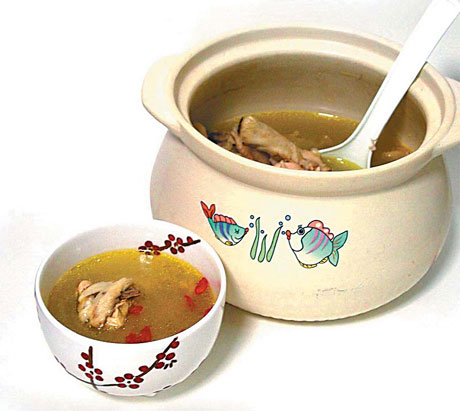
Recipe | Old chicken and angelica soup
Ingredients (serves 4 to 6):
1 old chicken (about 1.5 kg)
3-4 slices old ginger
20 g dried angelica root (dang gui)
Salt to taste
Method:
1. Clean the chicken well and remove the skin. Trim off any visible fat.
2. Place the whole chicken, the ginger slices and the dried angelica slices into a three-liter pot.
3. Add enough cold water to cover the chicken.
4. Bring to a boil and skim off any foam from the top of the soup.
5. After 10 minutes, bring the soup down to a simmer and cook for two hours, but not more.
Chef's notes:
Always start the soups with cold water, and do not boil soups more than two hours, or the nutrition will be lost.

2013 Chinese New Year |

Hidden dragons, crouching tigers |
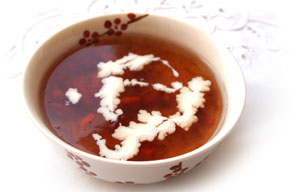
Soap beans, silver ears and peach gum |

Special:Winter Solstice |
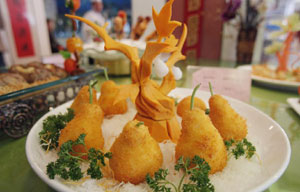
'Potato festival' kicks off in Shandong |

Mario themed restaurant opens in Tianjin |

HK carries out avian influenza tests on imported chicken |
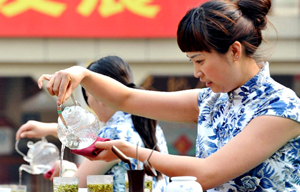
2013 China Tea Conference kicks off in Zhejiang |